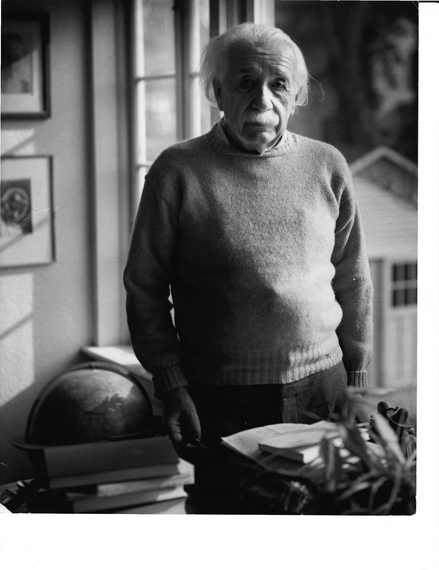Saturday, March 14, would have been Einstein's birthday. Looking through my Dad's stuff, I came across this photo, which reminded me of all the happy times I spent doing math puzzles and talking with Einstein when I was a kid.
I also came across a book entitled 112 Mercer Street which brought back more memories of walking up the short, dead-end street where we lived in Princeton, New Jersey, cutting through my grandparents' backyard to knock on Einstein's door, where I was warmly welcomed in.
What struck me as emblematic of Einstein's manner was that he opened his door to a wide range of people of different ages, with different interests, and from different backgrounds. Einstein really listened to different people's perspectives, patiently drawing people out with his unassuming manner and sincere interest, including children like me. While I knew Einstein welcomed many other people into his home, I was intrigued by the weekly group that assembled to talk in Einstein's study about a decade before I knocked on Einstein's door. The group included the politically active, patrician-born British philosopher, Bertrand Russell; the much younger, reclusive mathematician and logician, Kurt Gödel; and Gödel's contemporary, the sarcastic, intimidating physicist, Wolfgang Pauli.
In a previous post, I shared the importance of bringing together many voices and avoiding group think. Understanding that "science is a collective enterprise" [Feldman, p. 12], "a community of interlocked, perpetual, cumulative effort" [Feldman, p. 13], Einstein sought to bring together people with different perspectives, hoping to gain new insights. Encouraging an open exchange of ideas and viewpoints, Einstein was not afraid of disagreement, which bode well for the meetings of the four scientists since, according to Burton Feldman, the author of 112 Mercer Street: "four more varied - and difficult -- people would be hard to find" [Feldman, p. 19].
As I learned from my time with Einstein as a child, his home offered an oasis of openness and acceptance, demonstrating Einstein's firm belief that "everyone should be respected as an individual, but no one idolized."
Last summer, Michael Pacanowsky, the Gore-Giovale Chair of Business Innovation at the Bill and Vieve Gore School of Business, demonstrated that not only science but also organizational cultures can benefit from bringing together many different voices. As Einstein welcomed fellow scientists with differing perspectives and personalities into his home to engage in the collective enterprise of science, Michael invited a variety of industry professionals, academics, business leaders, and management consultants to an off-season ski resort in Park City, Utah to collaborate on envisioning ways to support high-performing organizational cultures. During our three days together, the meeting rooms and outside gathering spaces were abuzz with conversation, ideas, opinions, laughter, and energy, bringing together many different voices and perspectives to formulate ideas and plans. The open, accepting atmosphere encouraged us to think creatively and play with possibilities. While many of us had never met before, the collaborative format of the meeting facilitated our interaction, and allowed us to raise issues and disagree with each other in ways that brought about a better result.
Out of our summer gathering, the new Center for Innovative Cultures was established to help organizations thrive by unleashing the talent, passion, and potential of people at work. I think Einstein would feel right at home at our gathering last summer and would actively participate in Center events, offering ways to welcome different perspectives that can help organizations thrive.
Feldman, B., 112 Mercer Street: Einstein, Russell, Gödel, Pauli and the End of Innocence in Science.
Dr. Benay Dara-Abrams is the Lead Link and Co-Founder for Great Work Cultures, a certified ScrumMaster, creating high-performing agile teams, and a leader in the design and implementation of collaborative technologies and processes.
Follow Benay Dara-Abrams on Twitter: www.twitter.com/GWCLeadLink

